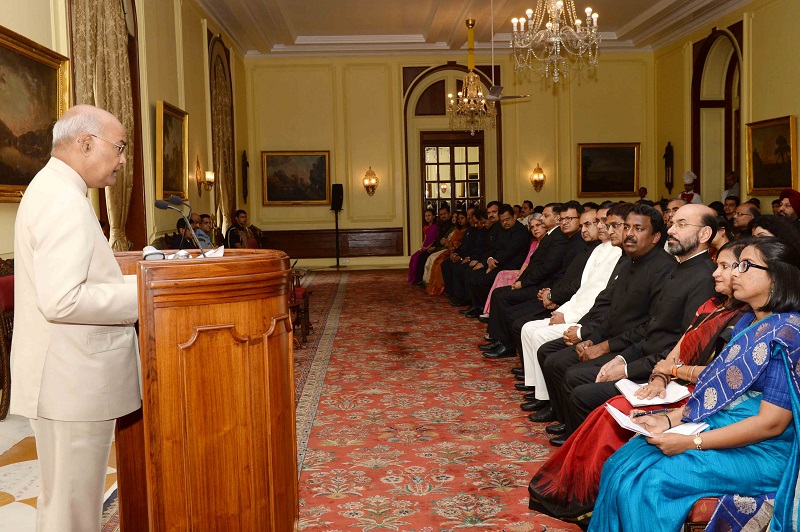ADDRESS BY THE PRESIDENT OF INDIA, SHRI RAM NATH KOVIND ON THE OCCASION OF CALL ON BY THE PARTICIPANTS OF THE 120TH INDUCTION TRAINING PROGRAMME, LAL BAHADUR SHASTRI NATIONAL ACADEMY OF ADMINISTRATION, MUSSOORIE
Rashtrapati Bhavan : 03.08.2017

1. I welcome you to Rashtrapati Bhavan and congratulate you on your induction into the IAS. This is significant achievement for all of you and I wish you and your families for the same.
2. You represent 18 different State cadres and came together for this Induction Training. You reflect the diversity of India and I am sure that during this training you would have learnt a lot more about India from each other. I am told that more than thirty per cent of the officers among you are women. This is a welcome statistic that reflects a modern India that aims for equality of opportunity to its womenfolk.
3. You have now graduated from your respective State Civil Services to the IAS, which is an All India Service. The All India Services have an extremely important role to play in the governance of the country and that too at different levels of government. It was none other than Sardar Vallabhbhai Patel, our first Home Minister, who realised that India could not be integrated and governed unless it had an efficient and professional All India Civil Service catering to governance both at the Union and State levels.
4. The All India Services have played a significant role in the development of the country and the growth of our economy. Indeed, no one can doubt the contribution of these services to our nation building. But, we must critique ourselves for ensuring that our Civil Services constantly improve.
5. It is important to ask whether we have truly lived up to the expectations of our people. Whether we been able to deliver the fruits of development in an equitable, fair and efficient manner. We have to be mindful of the expectations of our young population, and of the poor and marginalised sections of our society. We cannot ignore that there are often legitimate questions that are asked about the quality of our governance systems.
6. The most important challenge before you is to give confidence to the people of India – the people you are mandated to serve – that civil servants are fair, honest, professional and efficient.
7. As public servants, you need to be role models in your personal conduct. In your professional conduct, honesty and integrity, humility, and sensitivity to the diversity of India and of our society are nonnegotiable.
8. All of you work in the service of the people of India. However some people need government and its support more than others. You have to focus your energies to serve those among our fellow citizens who are economically weak, socially disadvantaged and politically under-empowered. It is these groups that need your attention the most. Your goal should be to make a meaningful improvement in the lives of such people.
9. The civil services have to function within the larger system of political governance. Political leaders are elected to represent the wishes of the people in a democracy, and frame the agenda of the government. Civil servants are to assist the political executive in formulation and implementation of policy.
10. They must ensure that government policies are formulated in accordance with the law and the spirit of the Constitution. Civil servants must have the courage to provide frank advice, independent and free from bias, to the political executive whom they assist.
11. For this officers need to encourage professionalism not only in their own working but also in the organisations they lead. They need to be strongly committed to updating their knowledge and skills – as well as building capacity of those who work under them.
12. The Induction Training Programme is an important milestone as you enter a new phase in your careers. The wider role you will now play in the governance and administration of India calls for re-alignment of attitudes, refinement of skills and expansion of perspective. I am sure that your experience in the State Civil Services provides you a base that will help you excel in your future role.
13. As an IAS Officer, you must inculcate and display an even greater commitment than before to rise above considerations of caste, community and regional identities. Wherever you may work – irrespective of the district or the state, the Ministry or the Department – you should give your best for the cause of nation building. I am sure that the Induction course at the Lal Bahadur Shastri National Academy of Administration has equipped you with the skills needed to take on higher responsibilities in your future career.
14. I wish you a long and fulfilling career in the IAS – and in the service of our nation and our people.